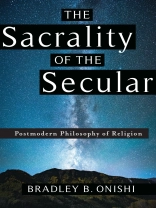Through a bold and historically rooted vision for the future of philosophy of religion, The Sacrality of the Secular maps new and compelling possibilities for a nonsecularist secularity. In recent decades, philosophers in the continental tradition have taken a notable interest in the return of religion, a departure from the supposed hegemony of the secular age that began with the Enlightenment. At the same time, anthropologists and sociologists have begun to reject the once-dominant secularization thesis, which both prescribed and described the demise of religion in modern societies.
In The Sacrality of the Secular, Bradley B. Onishi reconsiders the role of religion at a time when secularity is more tenuous than it might seem. He demonstrates that philosophy’s entanglement with religion led, perhaps counterintuitively, to vibrant reconceptions of the secular well before the unraveling of the secularization thesis or the turn to religion. Through rich readings of Heidegger, Bataille, Weber, and others, Onishi rethinks what philosophy can contribute to our understanding of religion and the wider social and cultural world.
Содержание
Acknowledgments
List of Abbreviations
Introduction: Philosophy’s “Turn to Religion” and Secularities
1. Different Worlds: Weber, Heidegger, and the Meaning of Life
2. Philosophizing with Religion: Secular Reenchantment in the Early Heidegger
3. Excendence and Heterology: Religious and Secular in Interwar Paris
4. A Prophet of the Impossible: Bataille’s Mystical Turn and Continental Philosophy of Religion
5. The Sacrality of the Secular: On the History and End of Philosophy of Religion
Conclusion: Contemporary Philosophy of Religion and Religious Studies—Three Examples
Notes
Bibliography
Index
Об авторе
Bradley B. Onishi is assistant professor of religion at Skidmore College. He is a coauthor of
Christian Mysticism: An Introduction to Theoretical Approaches (2009) and coeditor of
Mysticism in the French Tradition: Eruptions from France (2015).







![Обложка Brian Schrag & Julisa Rowe: Community Arts for God's Purposes [Chinese] 貼近神心意的社群藝術 Обложка Brian Schrag & Julisa Rowe: Community Arts for God's Purposes [Chinese] 貼近神心意的社群藝術](https://static.worldofdigitals.com/thumb_webp/740/9781645083740.webp)




